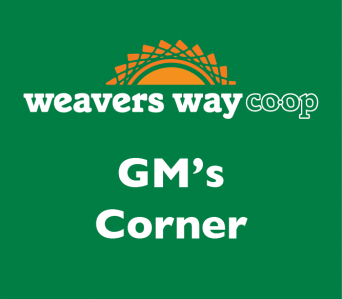
GM's Corner: When It’s Time, We’ll Need to Revive Our Status as a “Third Place”
“Social distancing,” a fellow member posited the other day, “is an existential threat to the Co-op.” I can only agree.
Ostensibly, Weavers Way is in the grocery business. And it’s true, we do sell groceries. But really, Weavers Way is in the “community business.” And our business model is being threatened.
Regular readers of the Shuttle know that we’re fond of calling the Co-op a “third place,” based on the social theory of urban sociologist Ray Oldenburg.
For those unfamiliar, as the theory goes, your first place is where you live, your second place is where you work (or go to school), and your third place is where you go for community connections. A third place can be just about anything: a public park, a barber shop, a pool hall, a coffeehouse. And it certainly can be a cooperatively-owned grocery store.
Robust communities have multiple third places and communities without third places really aren’t communities at all; they are just places where people live. As Gertrude Stein said in reference to her native Oakland, CA, in such places, “there’s no there there.” Apologies to the good people of Oakland.
We have spent decades, consciously or otherwise, establishing the Co-op as a community third place. And our success as a business is in no small part predicated on people feeling like a trip to the Co-op is like hanging out in the community’s living room.
Then along came COVID-19. The pandemic has forced us to limit the number of shoppers, wear masks, shop less frequently, leave the kids at home, and avoid long conversations. And, for goodness sake, there’s certainly no hugging, kissing or even handshaking allowed.
At least the Co-op has been able to keep its doors open. Philadelphia, its dynamism rooted in an abundance of third places, has lost many of them (evidenced by the fact that we are a city of 1.6 million people all in desperate need of a haircut).
So all of this is bad news. As long as it’s temporary, we’ll find a way to suffer through it.
But what if it’s not temporary? What if there’s a permanent shift in our feelings about proximity to others? What if “social distancing” becomes part of our culture?
This is not far-fetched thinking. Just about every public health official refers to the future normal in quotation marks, implying that our future normal will be significantly altered from our pre-pandemic normal.
Social distancing seems particularly likely to linger and establish itself as a new cultural norm. People have been spooked. And staying away from each other has never been easier, especially when grocery shopping. Corporate grocers can easily accommodate the socially anxious. Maintaining social distance is a lot easier in a Walmart or a Whole Foods than it is at Weavers Way or Captain Andy’s. Plus, you can always find a parking spot and you never have to wait in a line outside.
Before the pandemic, we were already a society made up of individuals living increasingly isolated from one another. More and more, we have become reliant on virtual tribes – often politically and socially partisan – for our information, support, validation, and comradery.
The last thing our already fractured society needed was a pandemic that forces us to keep even further apart. Isolation breeds division. Fear, distrust, and outright hatred of “the other” are inevitable byproducts.
The man who’s currently president of the United States, nothing if not cunning, thrives on the exploitation of our differences. His politicizing of the pandemic may be irresponsible, disgraceful, and self-serving (at least he’s stayed true to character), but it’s also quite effective at stoking the fires of our differences. At a moment when a more responsible leader could have united us to a common cause, we hate each other more than ever.
We don’t need any of this. What we need are third places — diverse ones, lots of them. And we, as member-owners of a bona fide third place, have an important role to play. I dare say our business model depends on it.
When the time is right, we must be prepared to breach those six-foot perimeters we’ve thrown up around ourselves. We must once again happily stand cheek to jowl with our fellow cooperators without fear or reservation, and we must embrace each other (quite literally) as citizens of the same neighborhood, city, nation, and human race.
The alternative is to test Oldenberg’s theory, which argues that third places are necessary components of civil societies, and without them society will fray and, eventually, fall apart. No thanks!
See you around the Co-op.
